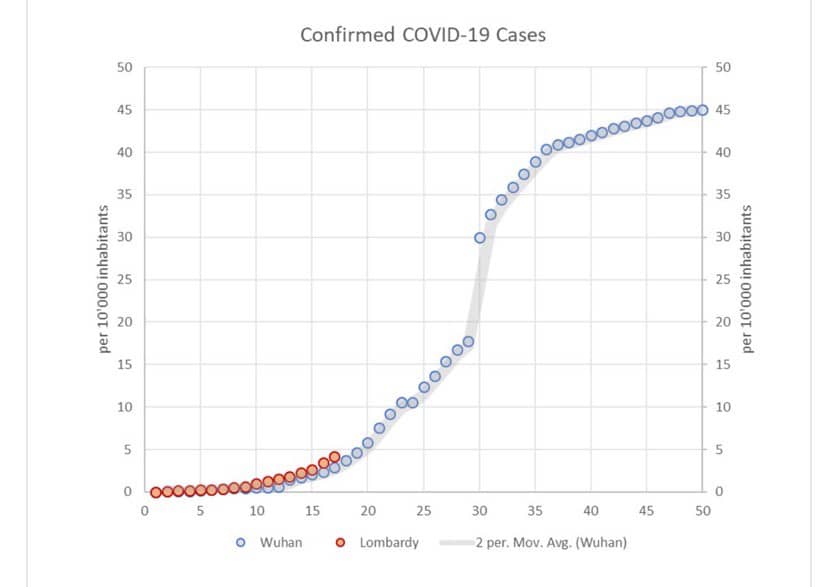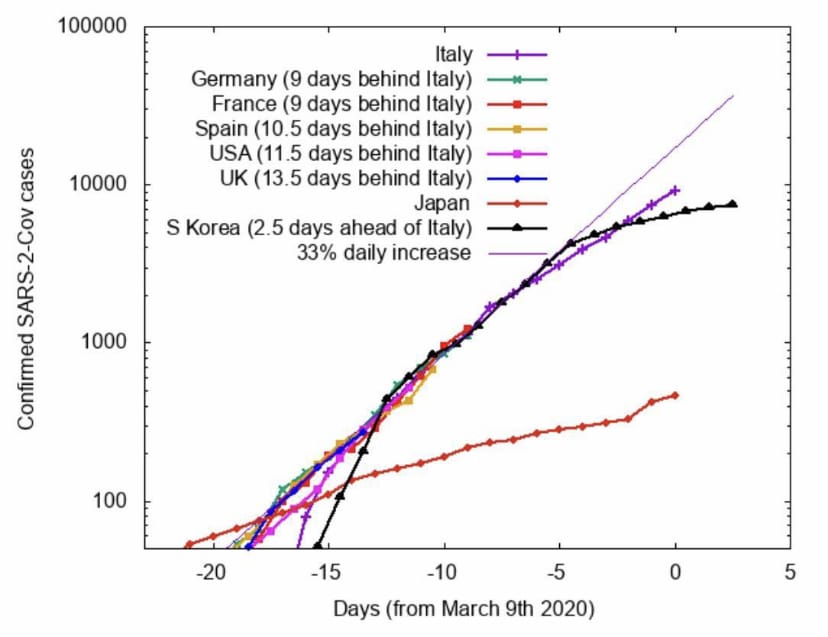We have a situation. It seems like it may get worse before it gets better. We need to take this very seriously. At the end of this article, I have included a portion of the guidance that the Italian medical association gave their doctors on Weds. If you have any doubt about why people are so rattled about what they may see as a little bit of the flu, skip below and have a read of what they are recommending.
This will also be over at some point. Our friends in Hong Kong are telling us that life there is slowly returning to normal. They are weeks to months ahead of us on this, so it is encouraging to know that there is an endpoint to it.
Follow Official COVID-19 Advice
There is plenty in the news about how to avoid the virus: don’t touch your face, frequent hand washing, and stay away from crowds. Follow this advice. The person you save may not even be yourself, but the person you infect from your carelessness. Personally, I am semi-self-quarantined. No more gym. No more restaurants. No more going anywhere where there are groups of people. I’ll go to the grocery store, the drug store, my local book store. I’ll go to the park, I’ll go running in the street when it is quiet outside. I’ll hang out on my roof. But otherwise no contact with others.
Flatten the Infection Curve
Containment is not really an option anymore. The main thing now is to flatten the infection curve — spread out the infections over as long a time period as possible. A massive influx of infections will swamp the health services and lead to some truly awful situations. The health care system will not only be swamped for COVID-19 cases BUT FOR ALL FORMS OF CARE. For our community, something like what is happening in Italy would be horrific. The canceling of most large events is a great sign — even the NBA! I take comfort that we are no longer denying that the virus is real.
How to Work From Home Effectively
There are some major social adjustments we are going to have to live with for a while. Working from home is a big one. For a lot of people, going to work has been an organizing principle in their lives, and now to suddenly be doing work from the kitchen table is a big change. I have never had a real job with a salary — well, I did for a few months in college, but that was eons ago. Not going to the AGEIST offices to work is no big deal for me. Here is some of what I know is important for working from home:
Make a routine. Every day, get up at the same time. Get properly dressed — no pajama days. If you can, eat breakfast then go for a fast walk around the neighborhood. This signals me that I am starting a new segment of my day.
Video conferencing is great. It’s not as good as face to face, but we run a company spread over a dozen time zones and have learned that it can work. Google Hangouts, FaceTime, Skype, and Zoom are some of what we use.
Chat. Slack can be used for that water-cooler conversation. The trick is to turn it off when you want to get something done. It can take over your day, but it is also perfect for reaching out and quickly checking in on people.
Social Media. Stay off it. You shouldn’t be on Facebook at the office and just because you are home doesn’t change that.
Have a lunch break. One of the things about working from home is the day tends to blur by. If you break the day up, with specific breaks and lunchtime, you will get more done.
Focus. This is hard at home, and one of the reasons people have offices. Resist the urge to clean some obscure part of your cooking apparatus. It can wait for the weekend. I put over-the-ear headphones on with no music, which helps me deep dive into whatever I am working on.
Family intrusions. This is a delicate one, especially if the kids are out of school. Setting clear boundaries of a time to engage is helpful. Some couples who work from home actually have a code word for each other for when they want to ask permission to speak to the other.
In the beginning, you may find yourself a bit disoriented. Working from home is not for everyone, but you will get the hang of it.
Here are some of the charts I have recently seen that have been of interest:



Overwhelmed ICUs Make Life or Death Decisions
On Weds, the Italian College of Anesthesia, Analgesia, Resuscitation and Intensive Care published recommendations for patient care. Many of their ICUs are overwhelmed, which has forced them to make life or death decisions in a wartime triage manner, as to who gets treated. This is why this virus is so serious. As translated here by The Atlantic Monthly:
“Informed by the principle of maximizing benefits for the largest number,” they suggest that “the allocation criteria need to guarantee that those patients with the highest chance of therapeutic success will retain access to intensive care.”
“It may become necessary to establish an age limit for access to intensive care”
The authors, who are medical doctors, then deduce a set of concrete recommendations for how to manage these impossible choices, including this: “It may become necessary to establish an age limit for access to intensive care.”
Those who are too old to have a high likelihood of recovery, or who have too low a number of “life-years” left, even if they should survive, will be left to die. This sounds cruel, but the alternative, the document argues, is no better. “In case of a total saturation of resources, maintaining the criterion of ‘first come, first served’ would amount to a decision to exclude late-arriving patients from access to intensive care.”
Criteria For All Patients in Intensive Care
In addition to age, doctors and nurses are also advised to take a patients’ overall state of health into account: “The presence of comorbidities needs to be carefully evaluated.” This is, in part, because early studies of the virus seem to suggest that patients with serious preexisting health conditions are significantly more likely to die. But it is also because patients in a worse state of overall health could require a greater share of scarce resources to survive: “What might be a relatively short treatment course in healthier people could be longer and more resource-consuming in the case of older or more fragile patients.”
These guidelines apply even to patients who require intensive care for reasons other than the coronavirus, because they, too, make demands on the same scarce medical resources. As the document clarifies, “These criteria apply to all patients in intensive care, not just those infected with CoVid-19.”



